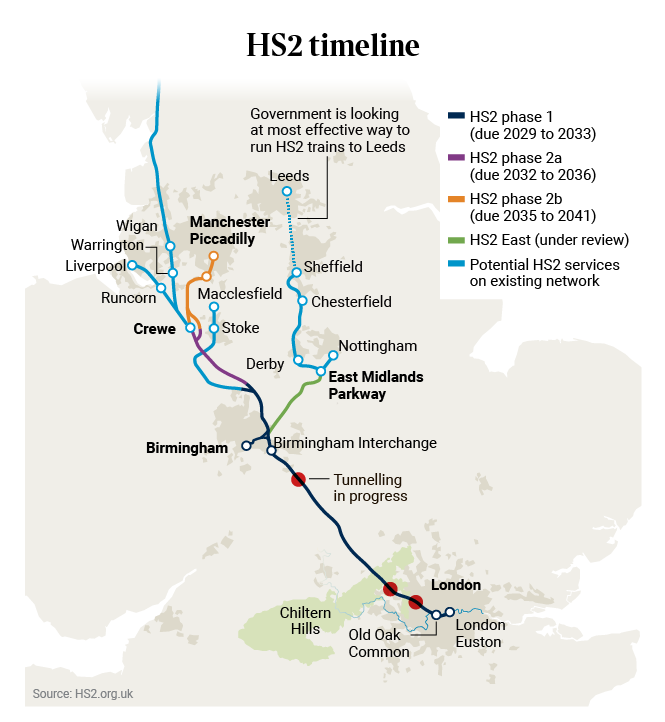A few weeks ago, whilst the UK was preoccupied with what Gary Lineker should or should not be allowed to say – ten out of seventeen minutes of the BBC news bulletin on 12 March were devoted to it – elsewhere the somewhat more expensive PR, and perhaps actual, disaster that is the UK’s HS2 rail project continued to twist in the wind with the latest news that key components would now be delivered two years later than the previous update (Crewe by 2036, Manchester by 2043? Maybe) and that the cost was edging towards an eye – catching £100 billion.
Move over Clint Eastwood – or David Byrne – because, being modest about our modesty when it comes to infrastructure finance and nothing if not global in reach, Logie Group recognises that the project needs to save money where it can so is offering some pro bono advice to the government on how to cut down this particular gibbet.
Switching metaphors, the real decision is whether to fold or twist. The historic cost of what has already been spent or committed, estimated at a cool £25 billion, is now sunk. (Some of these costs such as real estate near Euston can to some extent be recouped; others such as a tunnel under the Chilterns can’t). Could the money have been better spent on a line across the Pennines instead? Probably, but that is now irrelevant. Should the Pennines line also be built? Possibly, but that is a separate, if connected, decision. As with any project that is already underway, the equation for HS2 should be: What are the costs to completion? And what will the benefits be after that? The deeper into a project, the lower the costs to completion so the more likely it is that it will, after all, be worth completing.
- Run this comparison for each of the several alternative networks / modules being contemplated and make a decision. Crucially, delaying the decision may enable some obfuscation on the numbers but, in reality, it only adds even more to the cost due to capitalised interest.
- In terms of which alternative network to commit to, size / distances matter. The UK would appeal to Goldilocks: not too small when not much time can be saved, not too big when it is quicker to fly. Be careful with comparisons: Spain and France long ago built networks connecting population nodes with wide open (i.e. cheap, arable) spaces in between. The UK is much more congested. Australia is too big and underpopulated for High Speed Rail, the US too bogged down in red tape and its predilection for roads and air. China just built. Japan might be the best (and, as it happens, earliest) comparison. It is also congested (and its terrain more challenging) albeit with fearsomely high operating standards.
- Kitchen – sink the cost estimate for the network chosen. Yes, it will be a terrible number and will be met with outrage for a few days. But that is true of much of government spending these days. For example, in March last year, the government estimated that it had up until then spent £310 – 410 billion on Covid (what is £100 billion between friends, anyway?). At least, HS2 will deliver some benefits.
- Significantly, change the story from the costs back to the benefits. What are these? Many of the benefits are intangible and their value subjective – shorter travel times, more freight capacity on legacy lines (the story changes), less passenger congestion on other modes, cleaner air, etc – but they are still benefits. In particular, short haul flying should decline – if you want a cleaner planet, you are going to have to pay for it. And have these benefits changed because of the Covid restrictions? Crucially, there will be fewer high fare paying business people on board than was forecast pre – Zoom. (Too much disclosure here would continue to stoke the fire, though).
- Maximise the potential for real estate development over / next to stations. At least when it comes to urban rail, this approach has been so successful for the likes of the MTR here in HK and the SMRT in Singapore that they are thought of more as real estate companies which happen to run a rail network than they are as railcos.
- The benefits from regional rail won’t be as impressive as for urban rail but they will still be significant. Overall, recognise that regional rail never makes a profit in the simplistic sense because the project doesn’t capture all those external benefits. The role of government is to consider all costs and benefits, though, not just those capable of being captured by the project.
- The traditional approach when facing unpleasant risk is to find someone to share it with. This will be difficult for HS2 now!
Be bold. When in a hole, stop digging? Far from it. There is an argument to double down on the whole project by embracing the network effects that come with building a longer network (think telecoms or social media). Saving an hour off the trip to Auld Reekie is a lot more persuasive than saving ten minutes to Brum even if it is a city of a thousand trades.
Decisions on infrastructure finance are big, long dated, politically sensitive and downright difficult. HS2 has them all in spades but if Mark Harper surprises even Logie Group and shows some True Grit in expanding the network, remember that you heard it here first!

 Switching metaphors, the real decision is whether to fold or twist. The historic cost of what has already been spent or committed, estimated at a cool £25 billion, is now sunk. (Some of these costs such as real estate near Euston can to some extent be recouped; others such as a tunnel under the Chilterns can’t). Could the money have been better spent on a line across the Pennines instead? Probably, but that is now irrelevant. Should the Pennines line also be built? Possibly, but that is a separate, if connected, decision. As with any project that is already underway, the equation for HS2 should be: What are the costs to completion? And what will the benefits be after that? The deeper into a project, the lower the costs to completion so the more likely it is that it will, after all, be worth completing.
Switching metaphors, the real decision is whether to fold or twist. The historic cost of what has already been spent or committed, estimated at a cool £25 billion, is now sunk. (Some of these costs such as real estate near Euston can to some extent be recouped; others such as a tunnel under the Chilterns can’t). Could the money have been better spent on a line across the Pennines instead? Probably, but that is now irrelevant. Should the Pennines line also be built? Possibly, but that is a separate, if connected, decision. As with any project that is already underway, the equation for HS2 should be: What are the costs to completion? And what will the benefits be after that? The deeper into a project, the lower the costs to completion so the more likely it is that it will, after all, be worth completing. Be bold. When in a hole, stop digging? Far from it. There is an argument to double down on the whole project by embracing the network effects that come with building a longer network (think telecoms or social media). Saving an hour off the trip to
Be bold. When in a hole, stop digging? Far from it. There is an argument to double down on the whole project by embracing the network effects that come with building a longer network (think telecoms or social media). Saving an hour off the trip to 





